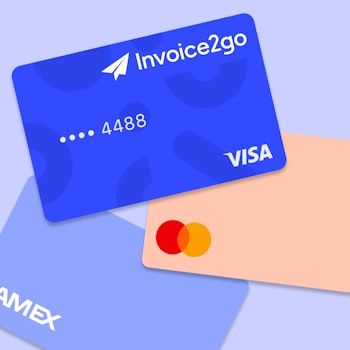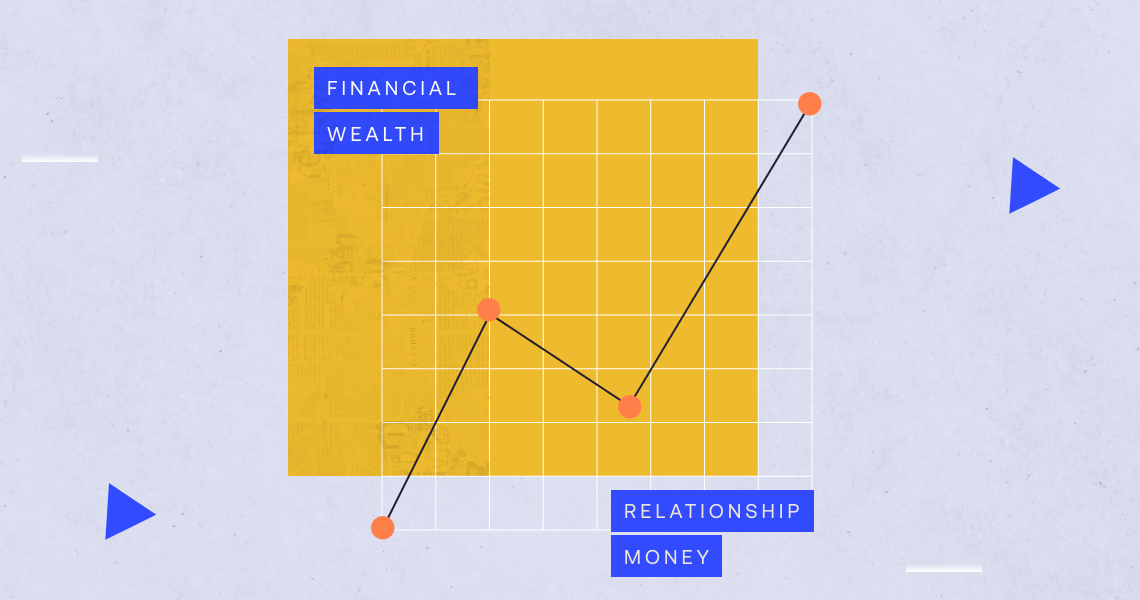
How to create a healthier relationship with money as a freelancer or small business owner
Money is one of the most profound causes of stress for all of us. But as a business owner or freelancer, creating a healthy relationship with money is critical to your success.
And why do we need to see it as a relationship? After all, money is a thing, not a sentient being. It does, however, occupy a lot of space in our lives, so perhaps we should treat it like it’s part of the family. And as everybody knows, no matter how annoying a family member is, they are your family, and you have to live with them. It’s always better to get along. Right?
What does it mean to have a bad relationship with money?
We all know what a bad relationship looks like in business and our personal lives. Bad relationships zap our energy, distract us from what matters, and make us question our value. They frequently delay our personal development, too, even though most of us learn from our mistakes.
However, a bad relationship with money can be even more destructive. Money troubles make you feel powerless, which could manifest in physical trauma or anxiety. It could also lead to avoidance behaviors – which is never good in a professional scenario.
If you’re having trouble sticking to your budget or constantly coming up short at the end of the month (or worse, at tax time), you need a plan. And having a financial plan is more than just making proclamations – it needs to be sustainable.
For example, you can’t just say, “If I make more money, all my problems will go away,” because unless you change your mindset and relationship with money, those ideas won’t stick. Imagine taking on more work than you can handle, simply to get yourself back to zero? Ultimately, this is an unsustainable approach because once you’ve made it back to square one, you’re still in the same boat.
How to improve your relationship with money: actionable tips for small business owners
So, you’re here because you want to improve your relationship with money. You’re motivated, and you’re committed to making financial issues a thing of the past—all good. But like any successful undertaking, you need a plan.
We know how challenging it can be to get started, especially if you’re feeling at odds with your finances already.
What are the priorities? What tools do I need to make it work? How long is it going to take? What are the rules? Is there even an endgame?
Read on to discover the answers to all this and more. To help freelancers and small business owners create a healthier relationship with money, we’ve put together some actionable tips you can put into practice right away. These tips address psychological, practical, and technological solutions so you can create a holistic plan that will grow with you.
Six ways to heal your relationship with money
1. Explore your financial values and limiting beliefs
Limiting beliefs create barriers to progress. Some of the unhealthy ideas we might have about money include: “Money is not important,” “Money is there to spend,” or “I’m just not good with money.” These are self-limiting beliefs, but they are not your destiny. Instead, replace these ideas with empowering ones like, “Money helps me achieve my goals in life and business,” “The money I spend isn’t helping me succeed,” and “I learn more about money every day.”
So here’s your action plan to tame those limiting beliefs. It might take a little work, but keep at it, and once the stress begins to lift, you’ll see your circumstances start to change.
Don’t assign a dollar amount to your self-worth
It’s incredible how many people do this. It’s even more concerning that it causes some people to do great harm to themselves or their companies because of it. You can be successful and quite comfortable in business without making millions of dollars. Make peace with yourself and realize that no matter how much money you do or don’t have, it doesn’t change who you are.
Stop obsessing over money
It’s not going to solve all your problems, and if you focus too much on it, you won’t be able to enjoy life—which is far too short and ought to be sweet. If you’re a slave to money, you’ll always crave more and won’t have room for the things that truly matter in life.
If you’re working too hard and can’t seem to get ahead, it’s easy to fall into the trap of thinking that success will never come. When you keep thinking that way, it will become a self-fulfilling prophecy.
Stop thinking you don’t deserve it
If you believe you don’t deserve it, you’ll never have the abundance you crave. This mindset often is a deeply held belief that may have originated in childhood. Did your parents work long hours and always complain there wasn’t enough money to go around? Maybe you grew up during the recession, and there was always anxiety about money and jobs. You need to let this go and find some peace with yourself. Your parents’ troubles are not your own, and it’s within your power to change.
2. Review your current financial situation and how you spend money
Every relationship in crisis merits some review. If you’re finding it difficult to stay in the black, you need first to find out where your money is going.
- Spend a day going through your monthly statements. Itemize every expense, both business and personal.
- Create a cash flow spreadsheet that shows money in and money out each day of the month. For example, you know your rent is due on the first, credit card payment comes out on the 25th, and invoices often have due-by dates. Based on what you know, you can estimate cash on hand on any given day, which can help you plan when you can pay down debt, etc. Sometimes, it’s easier to make sense of your finances when you see them in black and white.
3. Let go of guilt, reframe, and create new beliefs
An unhealthy relationship with money doesn’t have to perpetuate. Whatever limiting beliefs you bring forward from your childhood, marriage, or past relationships need not become your reality for posterity.
Think about where you are now and visualize where you want to be. That goal doesn’t have to be the end of the line; you can set new goals once you get there. Baby steps often make the most sense from a sustainability standpoint, as each incremental step forward won’t seem so overwhelming.
However, if your beliefs around money ideas are so ingrained in your psyche that you can’t seem to let them go, it might be a good idea to seek counseling. As every business owner knows, it’s never a bad idea to call in an expert when you need to.
4. Create a conscious plan on how you want to spend your time and money
As with any mission, you need to have a clear vision and roadmap that will get you where you want to be—but it’s also important to know what you’ll do once you get there.
Budgets tend to fail when they’re unsustainable. It’s kind of like saying, “I’m going to be a Rockstar” when you don’t even play an instrument. If you set your sights too high, you’re setting yourself up to fail. If sticking to a budget isn’t your superpower (and we’d wager that’s why you’re here), why not develop a conscious spending plan instead.
A conscious spending plan goes beyond your day-to-day budget and looks to the future. Much like a diet, if you really want it to work, you need to work it into your lifestyle. Money, like your health, is not just a temporary thing.
Conscious spending posits that once you understand your spending habits and know what brings you the most value (and satisfaction), you’ll be able to allocate each dollar more wisely.
For example, maybe once you examine your spending, you’ll notice you spent $180 on Starbucks last month. For that money, you could buy a kick-ass coffee machine so you can make coffee in the office—and channel the money you save back into the business.
You might also look at your paid subscriptions. When was the last time you used that software? Read that magazine? Watched that streaming service? It’s too easy these days to add new services, and the costs have a way of sneaking up on you. Be judicious, go through your list and unsubscribe to everything you no longer use. If you need the resource in the future, you can always resubscribe, but chances are you won’t even miss it.
These are just a couple of examples, but it’s really about value. Look at each line item and do a Marie Kondo on it. Does it bring you joy? Does it have some intrinsic value you can’t live without? If so, perhaps it’s worth it. But if it’s not, well—you know what to do.
5. Use business reports to stay focused
You can’t adequately manage a business unless you know what’s happening within it from day to day. Use technology to your advantage, as it can help you get paid faster and keep your payables and receivables organized. Invoice2go, a Bill.com company, is a user-friendly, all-in-one tool that helps you manage your business efficiently and save time on your most frequent tasks, like sending invoices, estimates, and quotes.
Your dashboard gives you a top-level view of your business, including paid, unpaid, and outstanding invoices, pending quotes, purchases, and so much more. Detailed reports can be customized to deliver insights on most things, including client history, sales figures, taxes paid, and taxes due. When you know what’s been paid, what you’re expecting, and when, it takes a lot of the worry off your plate.
6. Don’t forget about quarterly taxes
Easily one of the most significant money concerns for most business owners and freelancers is paying taxes. If you’re just getting started in business and don’t know much about it, taxes can be especially daunting—and stressful when they’re not paid on time.
We’ve seen this happen a lot during the pandemic, as so many new businesses launched and experienced rapid growth because their services were in high demand. As a freelancer or small business owner, you might be a solo act, meaning you’re wearing many hats—but also meaning it’s easier to let things slide because you’re so focused on serving customers.
Finding yourself behind the eight-ball with the taxman is never a good place to be, and it’s easy to fall into despair and think you’ll never get ahead, especially if you already don’t have a healthy relationship with money.
The IRS will work with you (they want their money, after all), but you can be sure they’re not going away. You can’t just ignore them because they could shut you down if you let it go too far. Your best strategy is to pay your estimated quarterly taxes on time and keep excellent records to ensure you’re on track. Late penalties add up quickly, and you certainly don’t want to pay the taxman any more than you must.
Estimating your quarterly taxes is a vital part of money management when you’re in business. Knowing what you owe and when it’s due will help you avoid overspending. If you plan purchases strategically around your fixed costs (rent, utilities, insurance, etc.), you’ll worry less, and that might just get you back into an innovative mindset.
Establishing better habits for a healthy financial life
Now that you know a little bit more about how to create a healthier relationship with money, you should be well-poised to go out there and crush it!
Keep in mind, whenever you feel overwhelmed, you’ve always got a strong, supportive community here to back you up. Our Freelance Forum is all about lifting you up, sharing inspiration and stories from people just like you who overcame great challenges on the road to business success.
Related Articles
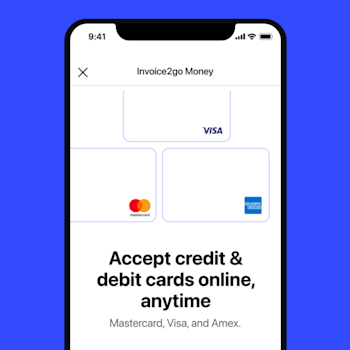
How to accept credit card payments on Invoice2go in 3 simple steps
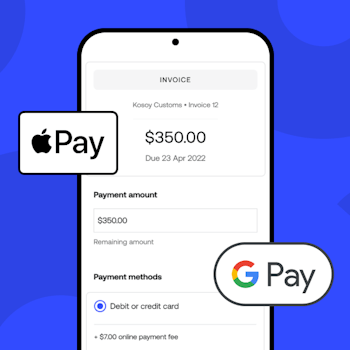
Accept payments online via Apple Pay and Google Pay

Must-not-miss write-offs as you wrap up 2022 year-end finances
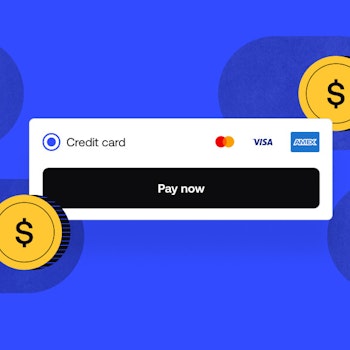
5 ways accepting credit and debit card payments helps your business stay resilient

4 easy ways to increase cash flow today

What is Small Business Saturday and why is it important?
The features and surprising benefits of a well-designed packing slip
